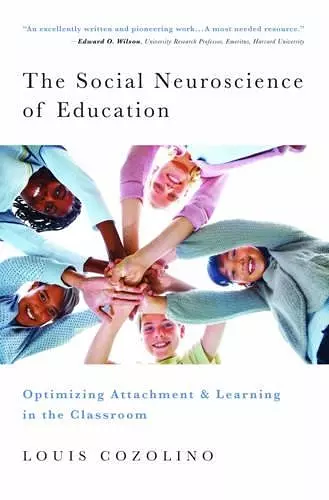The Social Neuroscience of Education
Optimizing Attachment and Learning in the Classroom
Format:Hardback
Publisher:WW Norton & Co
Published:7th Jan '13
Should be back in stock very soon

This book explains how the brain, as a social organism, learns best throughout the lifespan, from our early schooling through late life. Positioning the brain as distinctly social, Louis Cozolino helps teachers make connections to neurobiological principles, with the goal of creating classrooms that nurture healthy attachment patterns and resilient psyches. Cozolino investigates what good teachers do to stimulate minds and brains to learn, especially when they succeed with difficult or “unteachable” students. He explores classroom teaching from the perspectives of social neuroscience and interpersonal neurobiology, showing how we can use the findings from these fields to maximize learning and stimulate the brain to grow. The book will have relevance to anyone concerned with twenty-first century learners and the social and emotional development of children.
"[A]n extraordinary performance, primarily in summarizing the latest knowledge of neuroscience and referring to its application in education and schooling. It is also commendable how it goes beyond this application and creates new challenges for education and schooling. . . " -- Studia Paedagogica
"This book is applicable to all types of learners, irrespective of age, race, socioeconomic status, gender, or life history. Moreover, because The Social Neuroscience of Education is designed to be digestible for a range of readers, scientists who want to connect theories of the mind to education efforts will find the content just as meaningful as classroom teachers who want to better understand how the learning brain acquires new information." -- Harvard Educational Review
"[I]nteresting and dynamic . . . accessible and informative . . . Instead of retracing old paths and arguments, Cozolino presents a framework that builds on emerging findings from the new field of social neuroscience and provides important and practical applications for these findings to education. . . . Psychologists, neuroscientists, and educators alike will be able to pull from this book a better understanding of how the concepts of 'tribal communities' can be applied to the classroom, clinic, and research environments. " -- PsycCritiques
"[I]n over a decade of teaching, in various schools and under various administrations, I have not once heard a core message as important as the one this book carries. . . . Thank you, Dr. Cozolino. Your book has changed who I am as a teacher and parent. " -- Teacher Psych Blog
"The book is full of insights and practical applications to enhance teaching practice with lots of examples of how teachers can feel empowered in their practice and witness students’ delight and success in learning. . . . [A]n excellent book and should be read by all those who wish to teach and inspire future generations... " -- Contemporary Psychotherapy
"[T]horough and fascinating." -- PsychCentral
"What makes Cozolino’s book stand out is its thoroughness—both in recounting the research and in making the connections to practical applications.... [A] guide for teachers and anyone concerned with the state of education. Those wanting to make the most of their teaching opportunities, whatever the context, would do well to read this book and take its lessons to heart. " -- Greater Good
"I loved this book! The Social Neuroscience of Education is a synthesis of the world of social neuroscience and the field of education. I found myself re-reading sections again and again. . . . Not only does author Louis Cozolino, Ph.D., incorporate the most up-to-date neuroscience research, he peppers his beautifully woven narratives with wisdom from many cultures. . . . After reading this book, educators will never enter their classrooms again without reverence for the impact they have on their students, or ‘tribes,’ as Cozolino refers to them. " -- 2e Twice-Exceptional Newsletter
"An excellently written and pioneering work on education. This book provides information that has been lacking in the field. A most needed resource. " -- Edward O. Wilson, University Research Professor, Emeritus, Harvard University
"With the advent of increasingly sophisticated neuroimaging technologies since the late 20th century, the fields of social and affective neuroscience have expanded exponentially. In parallel with this expansion of neuroscientific knowledge, there has been a growing emphasis in the field of education on the important roles of emotions in learning. This text launches the conversation between these areas and is a much-needed resource in helping teachers learn about the central role of social interaction in organizing the developing brain and mind. " -- Mary Helen Immordino-Yang, Ed.D., Assistant Professor of Education, Psychology and Neuroscience at the University of Southern California
"Cozolino’s ingenious book weaves together new discoveries about attachment and brain science to address the concerns of both parents and scientists about the effects of educational institutions on children. The book provides a glimpse into the ideal future, when scientific facts and clinical insights will be seamlessly combined to help all of our children develop a passion for learning. Cozolino has the brain of a teacher, the heart of a therapist, and the writing talents of a master storyteller. No one has made interpersonal neurobiology more relevant to education. I hope that educators read this book—and that they listen, learn, and act. " -- Andrew N. Meltzoff, Ph.D.; Co-author, The Scientist in the Crib; Director, Institute for Learning & Brain Sciences
"Lou Cozolino insightfully explains how secure attachment and supportive relationships are critical for healthy psychological development and the building of social brain networks. He eloquently describes how the brain is a social organ of adaptation that is critical to cognitive development. The same social brain networks should be kindled by teachers as they strive to build a community of learning. This book is a must-read for educators and their administrators. " -- John Arden, PhD, author of Rewire Your Brain and Brain-Based Therapy
ISBN: 9780393706093
Dimensions: 244mm x 168mm x 33mm
Weight: 873g
448 pages